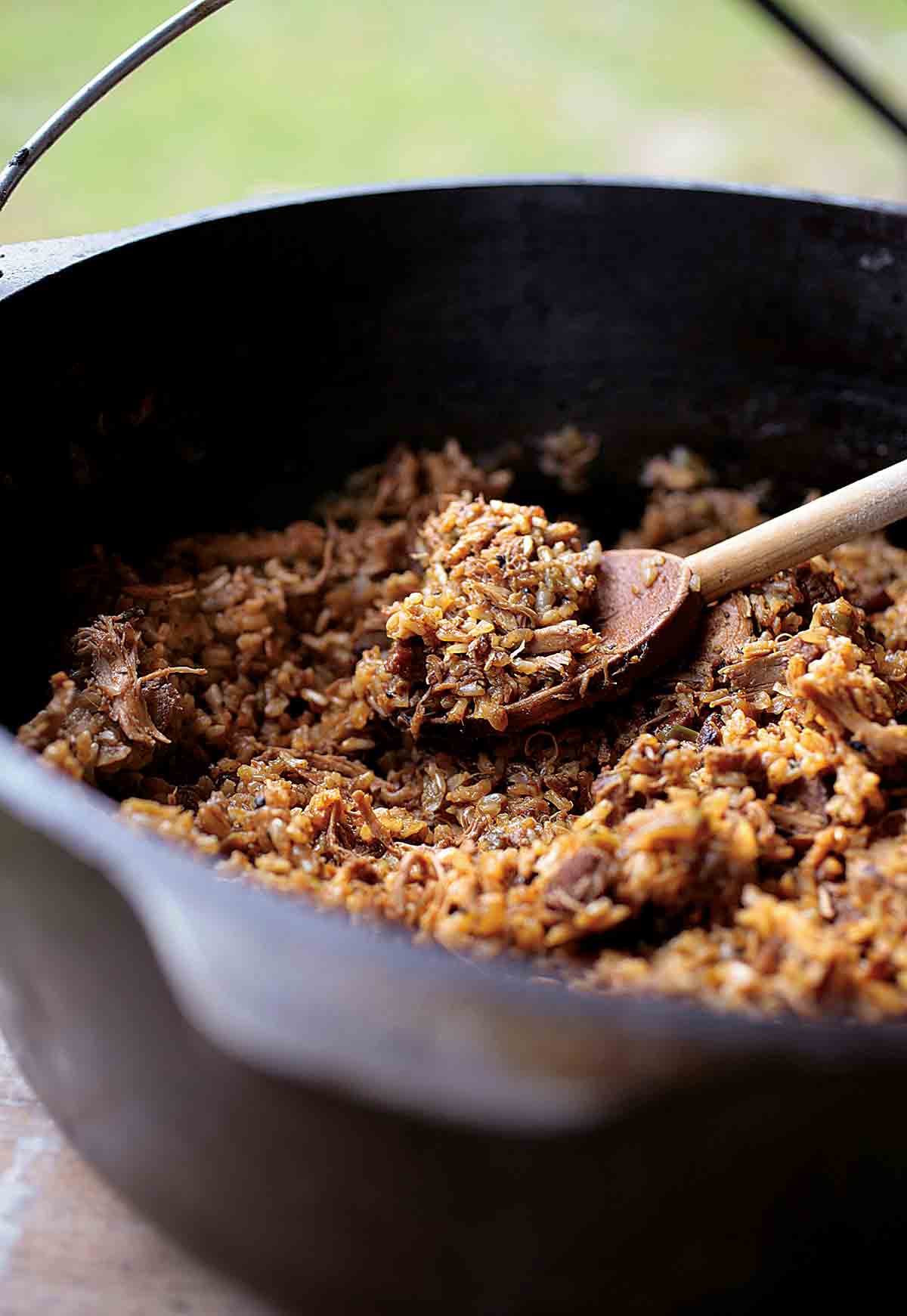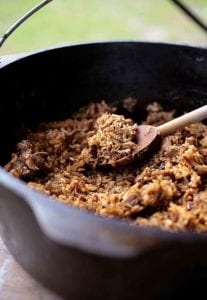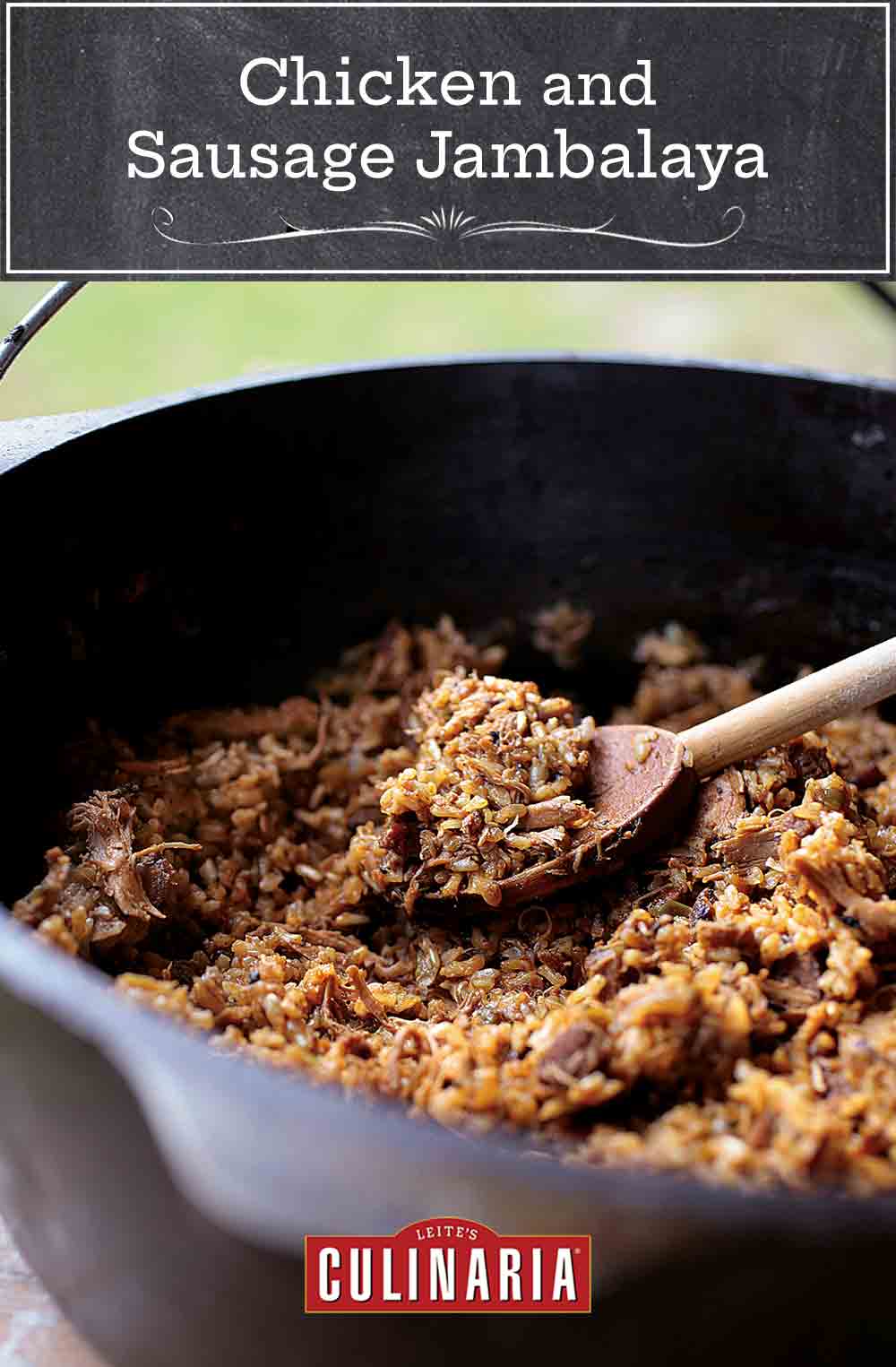
In my opinion, there are two types of jambalaya—Cajun and Creole. The main difference is that in the Creole version, the rice is cooked in a tomato-y sauce that might include shrimp along with meat and sausage. The Cajun approach is more rustic. I prefer the way the chicken and sausage flavor blend into the rice in this Cajun version, creating a robust meaty flavor. Searing and caramelizing the meat and onions individually prior to simmering everything together develops not just color but a deeply browned taste.–Donald Link

Cajun Chicken and Sausage Jambalaya
Ingredients
- One (3- to 4- pound) chicken, roasted
- 1 green bell pepper, cored, seeded, and diced
- 1 red bell pepper, cored, seeded, and diced
- 2 small jalapeno peppers, seeded and minced
- 1 bunch scallions (white and green parts), thinly sliced
- 3 celery stalks, diced
- 4 garlic cloves, minced
- 2 medium onions, 1 quartered and 1 diced small
- 10 cups cold water
- 1 tablespoon mild vegetable oil
- 1 pound smoked sausage, diced
- 2 tablespoons butter
- 1 tablespoon Donnie’s Spice Mix
- 2 teaspoons salt
- 5 bay leaves
- 2 teaspoons dried oregano
- 2 tablespoons store-bought or homemade tomato paste
- 2 cups long-grain rice, rinsed
Instructions
- Remove all the meat from the chicken and discard the skin. Shred or chop the chicken. Save all the juice and fat from the roasting pan (or store container, if you're relying on a rotisserie chicken) in a separate container. Refrigerate both until needed.
- Trim and dice or mince the bell peppers, jalapeno, scallions, celery, and garlic, reserving the trimmings. Place the chicken carcass, quartered onion, and vegetable trimmings in a large pot. Add the cold water and bring to a boil. Reduce the heat and simmer gently for about 1 hour, skimming any foam from the surface as necessary. Strain the broth and discard the solids. You should have about 6 cups of stock.
- Heat the oil in a large cast-iron skillet over medium-high heat. Add the sausage and sear until it starts to color, turning as necessary. Parts of the sausage will begin to stick to the pan. When there is a goodly sausage-y coating stuck to the pan, pour in 1/4 cup of the chicken stock and cook, stirring and scraping the skillet, until it comes loose. Let this simmer gently until all of the liquid has evaporated. Transfer the sausage to a plate.
- Return the skillet to medium-high heat, add the butter, and heat until it melts. Add the diced onion and cook until it starts to stick to the pan, about 5 minutes.
- Deglaze the pan with 1/4 cup of the chicken stock and let this reduce until the skillet is dry (or au sec, as they say in French kitchens). Continue to cook until the onion turns a nice, deep, brown color, about 5 more minutes.
- At this point the onion will start to stick to the pan again. Add 1/2 cup of the chicken stock and simmer. When the stock has almost completely evaporated, add the bell peppers, jalapeños, scallions, celery, garlic, the 1 tablespoon of the spice mix, salt, bay leaves, oregano, and tomato paste. Cook, stirring often, for 10 more minutes, until things start to stick to the darn skillet again. Deglaze with another 1/4 cup stock and reduce again until the skillet runs dry.
- Add the shredded chicken, 1 cup stock, and the defatted juices from the chicken and simmer until the liquid is reduced by half.
- Transfer the vegetable mixture to a large, heavy-bottomed pot and add the sausage, rice, and the remaining 4 cups stock to the pot and stir well. You want the mixture to have plenty of room so the rice will cook evenly. Heat, covered, over low heat for 40 minutes.
- Remove the pot from the stovetop and keep covered for 10 minutes while it rests. If the rice seems a little unevenly cooked, leave the lid on a little longer and it will even out. When the jambalaya is done, transfer it to a casserole dish and serve. (If you leave it in the pot it cooked in, the jambalaya will continue to cook and become dry.)

Explore More with AI
Nutrition
Nutrition information is automatically calculated, so should only be used as an approximation.
Recipe Testers’ Reviews
Did you know only 68% of the recipes we test make it onto the site? This recipe survived our rigorous blind testing process by multiple home cooks. It earned the Leite’s Culinaria stamp of approval—and the testers’ reviews below prove it.
This is it, folks. This is EXACTLY what jambalaya should taste like. It’s rare that I think a recipe is perfect, but this chicken and sausage jambalaya recipe has all the flavors spot-on.
The recipe calls for a roasted chicken, which apparently you can do any way you want. I used a chicken I had “roasted” on the grill. That meant I didn’t have any pan drippings, but I did have a flavorful smoked chicken. The sausage I used was a smoked pork sausage that I bought at one of the many butcher shops near Breaux Bridge, La., that sells boudin, sausage, and other specialty meats. I stock up every time I pass through. I think it’s important that you use a smoked sausage here.
My chicken broth was pretty standard, made from a few vegetable scraps and your chicken carcass after you’ve picked the meat off. The technique of reducing the stock as you cook the vegetables is the key to making this dish taste rich and flavorful. The end result here is a very meaty, delicious chicken and sausage jambalaya that tastes just as it should. Which is damn good.
While the recipe calls for this to be made in a skillet and then a larger pot, it can be made all in one pot if you use a very large cast iron or enameled cast-iron Dutch oven. But I am talking BIG here.
This chicken and sausage jambalaya recipe is worth the effort. Little did I know that one of my guests is a jambalaya enthusiast. Everyone really loved this jambalaya. It had a perfect balance of heat and depth. It was full of flavor but not overpowering. The rice had a silken feel but still maintained some bite to it. My jambalaya enthusiast said he would order it in a restaurant and asked if he could take some of the leftovers home with him. It was all delicious.
For convenience sake, I picked up a roasted chicken and made the stock a day in advance. While the stock simmered, I prepped the vegetables for the next day. The next day’s cooking was a breeze. This was nice because I decided to serve this to company coming for dinner that evening.
The only thing I might do when I make it again is roast the chicken carcass before I make the stock.
This, my friends, is as good a jambalaya as I’ve had. The recipe is an afternoon project, and I assure you, it’s worth every minute. When I made this, I had hopes of taking it to work for my buddies a couple of days later…a nice thought, but it was so good, of course it never made it out of my house.
I’ve never had jambalaya before, so I have nothing to compare this recipe with as to its authenticity, but the taste was stupendous. The spice mix is what I think really makes this dish shine. Along with everything else, it produces a wonderful multitude of rich, hearty, comforting flavors and textures that left everyone sated.
This chicken and sausage jambalaya recipe requires a fair amount of preparation and work, but it’s worth the effort. I used a store-bought rotisserie chicken for simplicity and a chicken andouille sausage instead of pork. I don’t care for green peppers, so I added yellow instead. And I made an addition, which I don’t think is traditional, of peas at the end of cooking, just because I cannot seem to have rice dishes without peas. I will make this again, most certainly as a fall and winter dish, and for any potluck I attend.
The layers of flavor created by the continual cooking down of the liquid in this chicken and sausage jambalaya are amazing. The house smelled really good. This is quite an involved recipe. Also, the spice mix is very “hot,” so you may need to make an adjustment if you have children eating this dish.















This sounds terrific! Is there a part of this that could be done ahead of time? Thanks so much–By the way, I love your emails!
Deborah
Hi Deborah, I’m so glad you’re enjoying the newsletters! You can absolutely get a jump on this. The chicken can be roasted and shredded, and the stock made, a day or two in advance. You could even cook the vegetable and sausage mixture right up through step 7 and refrigerate it. Just don’t add the rice and final liquid until you’re ready to finish the dish; otherwise, the rice will turn to mush.
Love this recipe. I get compliments every single time I make it, one of my signature dishes now.
Allison, I’m delighted hearing that this has become one of your signature dishes! That’s the ultimate compliment. Glad it’s getting the rave reviews it deserves—sounds like you’ve got a real crowd-pleaser on your hands. Thanks for sharing!